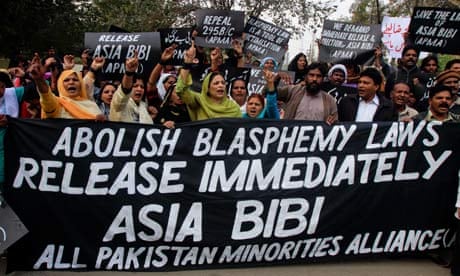 Nasir Saeed
Nasir Saeed
It is a growing trend among extremists to kill anyone accused of blasphemy and to become heroes in this world to secure a place in ‘paradise’ after death.
Pakistan’s controversial blasphemy law is once again in the headlines. The world’s media is talking about Aasia Bibi’s sorrowful story. She was accused of blasphemy in 2009 and, since 2010, has been on death row. On October 16, 2014 the Lahore High Court (LHC) rejected her appeal; her suffering will continue for many more years because of the country’s blasphemy laws. A further appeal is due to be submitted in the Supreme Court (SC) and, although there is hope that she will be freed, there is no guarantee that after an acquittal she will be safe and able to lead a normal life.
Aasia’s blasphemy case will be the second in Pakistan’s history to be heard by the SC. The majority of cases are decided in the high courts with convictions being quashed but this time, unfortunately and unexpectedly, the LHC upheld her death sentence. Aasia has been facing great threats to her life as a bounty had been announced and attempts were even made to attack her in prison. It is being said the judges were swayed because of pressure from the dozens of Islamists who were present in court. Unfortunately, extremists have become so powerful that sometimes judges and the police become helpless, as seen in the case of Rashid Rehman, a lawyer who was openly threatened in court and then killed in his office for defending university lecturer Junaid Hafeez. It is terrifying to think what kind of society we have developed into and how religiously intolerant we have become.
How can we forget the Governor of Punjab, Salmaan Taseer, who was killed by his own police guard, Malik Mumtaz Qadri, for supporting Aasia Bibi and talking to then president Zardari about her pardon. Another Christian minister, Shahbaz Bhatti, was also killed for supporting Aasia and demanding changes in the blasphemy law, increasingly being misused against Christians who consider it a root cause of their persecution. Qadri has proudly admitted his crime, telling the court, “I acted against a blasphemer as per the guidelines of the Quran and the teachings of the Prophet Muhammed (PBUH).” He is treated like a hero and, therefore, when he was sentenced to death by Judge Syed Pervez Ali Shah, the lawyers and Islamists surrounded his court and threatened to kill him, forcing him to flee Pakistan.
It is a growing trend among extremists to kill anyone accused of blasphemy and to become heroes in this world to secure a place in ‘paradise’ after death. The government’s silence encourages this mindset, despite it being its responsibility to protect all its citizens, even those who are in prison. It is unlikely that Aasia will be executed but still it is difficult to predict whether she will get justice as today’s judiciary is very different to that which set aside the high court’s decision on August 15, 2002 and set free Ayub Masih. His was the first case to reach the SC and one of the country’s most famous lawyers, Abid Hasan Minto, agreed to represent him. His previous lawyer, Asma Jahangir, is said to have refused to represent Ayub any further after receiving death threats. She had also successfully represented Salamat and Rehmat, two teens charged with blasphemy, in the LHC but the judge who freed them was murdered by extremists. This sent a ripple of fear through the legal fraternity. The refusal of lawyers to take up blasphemy cases greatly upset Bishop Dr John Joseph and, therefore, when Ayub Masih was sentenced to death, he shot himself dead in front of the same court in Sahiwal in protest at the injustice being done to Christians in the name of religion.
Although many politicians, including the then Prime Minister Nawaz Sharif, were saddened by the tragic death of the bishop and promises were made to look into the matter, the changing situation of the country because of the Indian nuclear explosions saw a change in priorities and the whole matter was put aside.
The suffering caused by the blasphemy law is severe and its impact is palpable as several churches, temples and Christian towns have been reduced to ashes and several innocent people have lost their lives in vigilante killings. Mob justice is becoming more popular because no one is ever questioned and victims are not even given a chance to prove themselves innocent. Very often, due process is denied to the victims of the blasphemy law.
Aasia’s case is another chance for Nawaz Sharif to look into this matter. He owes this to Bishop John Joseph. It is also a chance for him to stop the law from making a mockery of Pakistan and to promote a positive image of the country. It is also the responsibility of the present government to prevent this law from further misuse so people like Aasia Bibi do not have to suffer in prison for years, and nobody is killed for a crime they have never committed. Aasia vehemently denies the charges against her but still she has been denied justice. Now, after the court’s decision, she will have to spend several more years in prison. She and many other people falsely charged under the blasphemy law are suffering needlessly. It is the government’s duty to bring this matter to parliament, to debate and amend it appropriately.
Recently, we have seen the news that Ireland is going to announce a referendum to remove the blasphemy law from its constitution. Why should the Pakistani parliament not learn from this? Since Aasia’s appeal is going to be submitted to the SC, I remain hopeful that the judges will decide her case diligently and without any fear and pressure, and that she will finally get justice.
Nasir Saeed

No comments:
Post a Comment